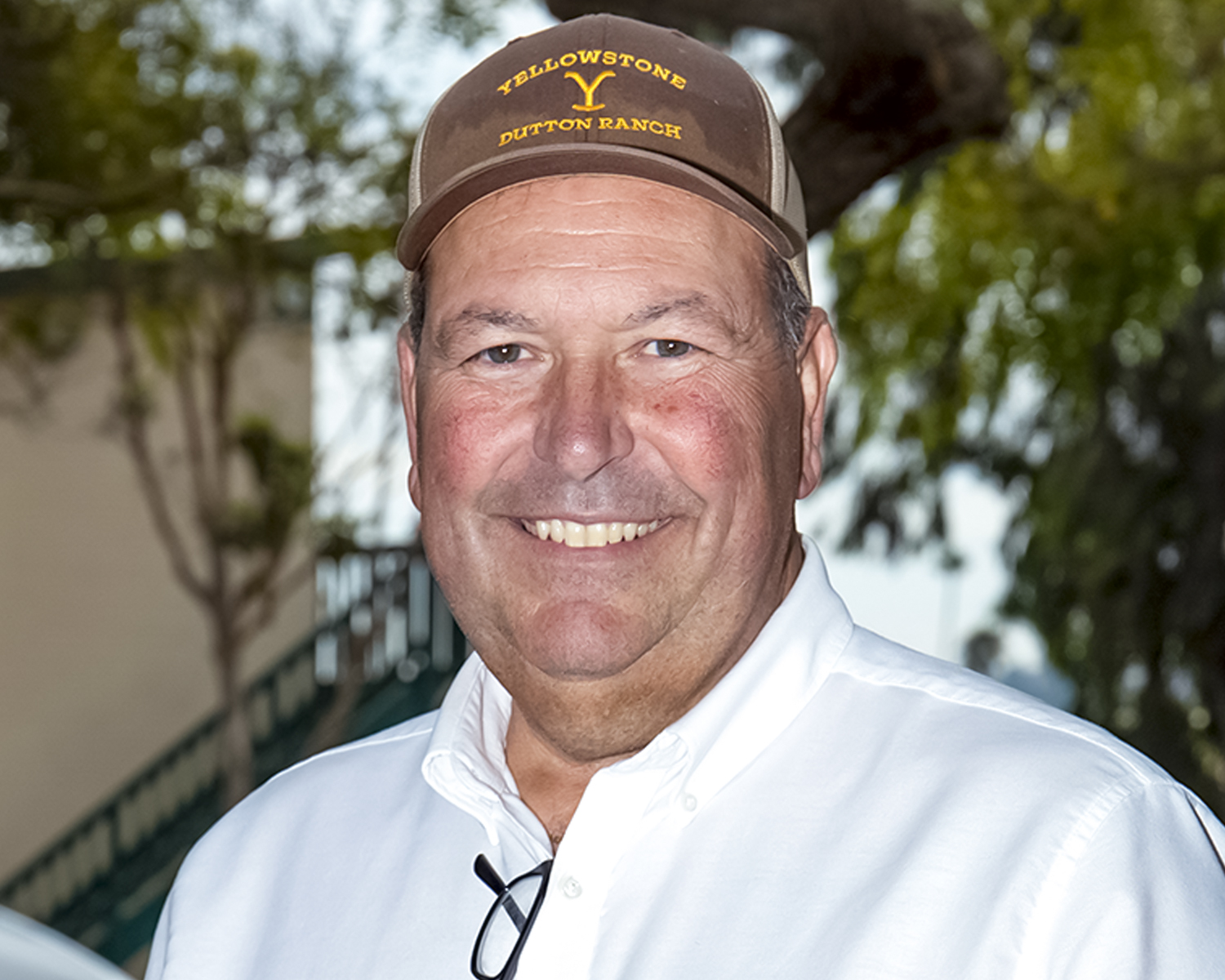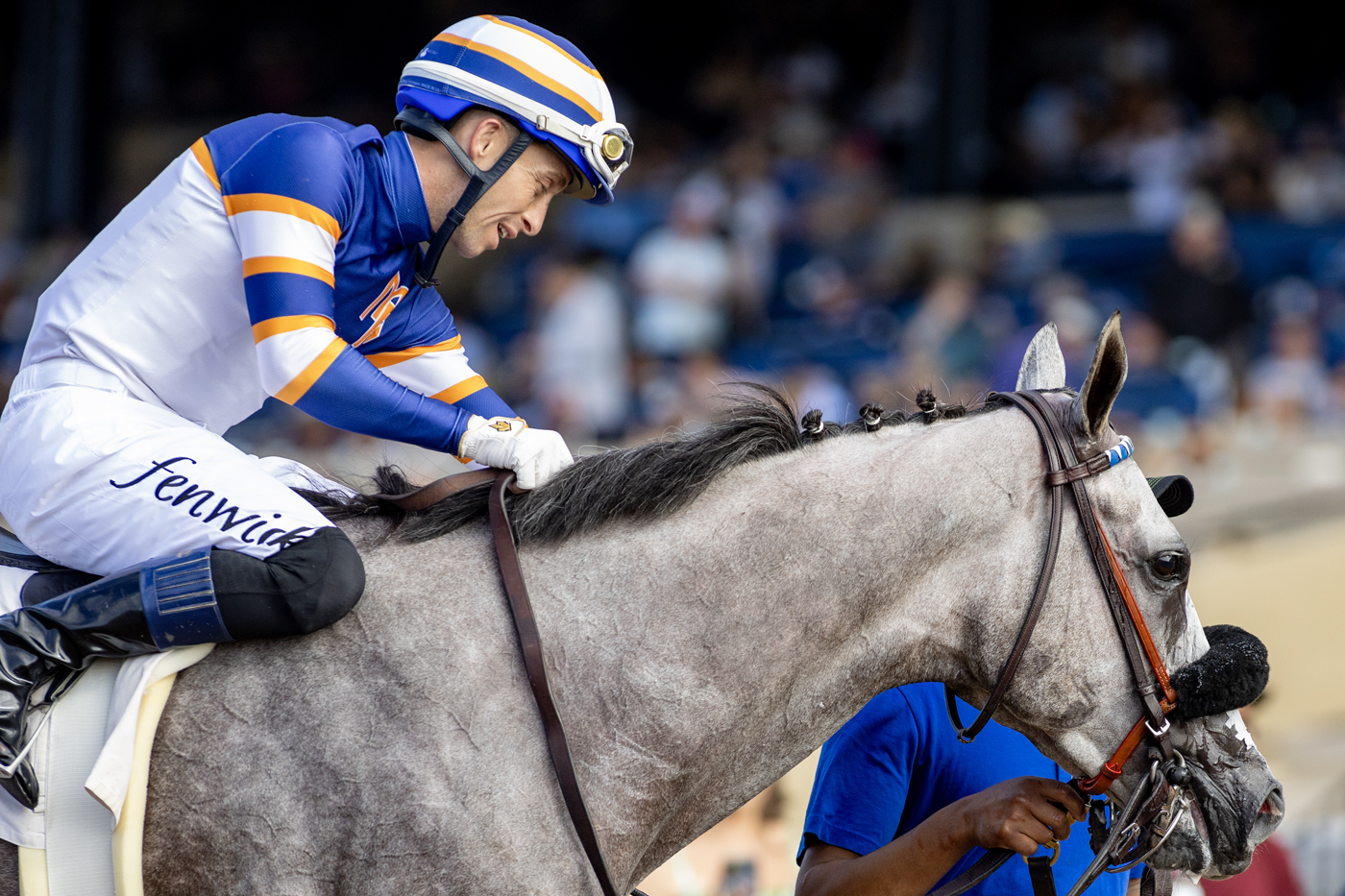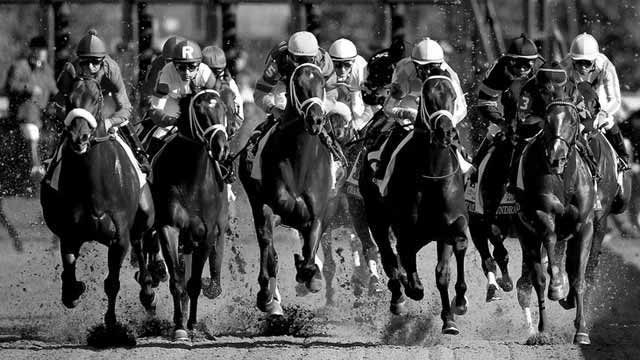
Jack Carava © Benoit Photo
Most men in their 50s are starting to entertain thoughts of retirement. Dreaming of that day when they can walk away from their job and begin traveling the world and spending more time with the family. Very few are contemplating a career change.
Jack Carava took that leap of faith in 2020 and he’s never looked back. Carava was a successful trainer in southern California for almost 40 years. But he was becoming disenchanted with the job and instead of breaking out the calculator and crunching the numbers to come up with a way to retire comfortably, he began exploring something that would keep him in the horseracing industry. A new and different job in a familiar profession. He settled on becoming a jockey agent.
“I was getting a little low on horses,”Carava remembers. “I still had around 20 horses but the game started to change with the pressures of workman’s comp and all the things you hear people have issues with. It began to not make financial sense for me personally. I don’t think that’s the case with everybody but for me it just didn’t pencil out anymore.”
A jockey agent wears many hats around the track. He’s a strategist, a counselor and a personal assistant. Usually he’s the one who decides which horses a jockey will ride. He’s the one that roams around the backside talking and pitching his rider to the trainers. He’s the one who makes the arrangements when it comes time to go out on the road or simply make the summer move down to Del Mar. He handles the media requests for interviews. The jockey agent also acts as a therapist when things go south on a rider.
“Tyler Baze at the time had been riding back east,” Carava remembers. “Tyler had ridden a lot of horses for me and I consider him a good friend. I knew he needed an agent so I called him and told him I was thinking about making this change. It sounded good to him so we gave it a try. It was a little slow starting off but we started building up business. I picked up Kyle (Frey) as a second rider and it just mushroomed.”
Carava has been with Frey for the past three or four years. He picked up Geovanni Franco about a year and a half ago.
“I love Jack, he’s been so supportive,” Frey says. “Though I only rode one horse for him he was always one of the nicest people. He was always ‘Hey, how ya doing?.’ I just loved that about him. If I’m going to deal with somebody every day, I want it to be a good person. And he’s a helluva horseman. He was one of the claiming kings around here for years so I know he knows horses. You don’t do well claiming if you don’t know how to read a Form and see the upside to a horse.”
Carava was born in Arcadia, California on April 28, 1966. His father was an accomplished trainer in his own right during the 1970’s and ‘80’s so Santa Anita became Jack’s second home.
“I was tiny,” Carava says. “I was going to the track with my dad when I was 2-years-old. My dad trained horses and then he worked on the starting gate. He did all kinds of jobs around the track so I was always there as a kid.
“When I was growing up Santa Anita was a big thing,” Carava continues. “It was exciting. Big crowds and all that stuff. It was a good time in racing in general.”
The Carava family moved around a bit. They lived in the Bay Area for a while and in Seattle for a year. But as Jack got older, he was looking into a different side of the business to work in, something other than training like his dad.
“When I was in school, I was pointing to become a veterinarian,” Carava says. “But I just didn’t like the thought of going to school that long. I did one year of junior college and then started working around the track a little bit more.”
He hooked up with trainer Joe Griffin’s barn in 1984 and later moved over to work for Jerry Fanning. It wasn’t long before Carava started to get the itch to move out on his own and Fanning was very supportive.
“Jerry had a lot of horses at the time,” Carava notes. “He always allowed me to keep one or two horses on the side. I was young and didn’t need a whole lot. I was living in a tack room down here (at Del Mar) for a little while in the summers. In those years I had a safety net because I was also an assistant trainer (for Fanning) at the same time I was training. I also always had my parents’ house to go to.”
Carava’s first venture into training on his own was short-lived.
“I went out on my own and I had six horses,” Carava says. “My horses were always with Jerry’s, in the same barn. One year I got my own barn. First week I had a horse get hurt in the morning and needed to turn him out. Something happened to a second horse who needed to be sent to the farm, too. I ran three horses on the weekend, and they all got claimed. So, I was down to one horse and I walked back up the road and asked Jerry ‘Can I get my job back?’ I worked for him for another two years.”
It wasn’t long before Carava got his feet under him and around 1992 he was able to go out and stay out on his own.
“When I was getting started, claiming was an integral part of this game,” Carava says, “way more so than it is today. There were so many more opportunities to claim horses. We would just buy and sell and trade horses continuously. I had one summer when I brought 30 horses to Del Mar and in seven weeks, when I went home, I still had 30 horses but 28 of them were different from the original ones.
“It was easier then because there were always horses to claim every day,” Carava continues. “Now, if you find a horse a week to claim it’s a big deal.”
Claiming soon became Carava’s niche, and he was good at it.
“I had those kinds of clients who enjoyed that action,” Carava states. “That dictated more or less why I was a claiming trainer at the time and why I had so many claiming horses.”
Carava contends that there is no way he could do today what he did in the 1990’s and early 2000’s.
“No, not at all,” Carava says. “It’s not possible anymore because of the structure of the condition book nowadays. Del Mar’s a little bit different but you’ll see up at Santa Anita so many of the races are starter/allowance races. There’s just not as much opportunity to claim.”
Carava’s barn began piling up the victories in 1996 and would string together 16 consecutive years exceeding $1 million in yearly earnings. His best year was 2011 when the barn compiled over $2.16 million. Most of the success coming with claimers and not high-priced stakes horses.
“I think it was just sheer numbers,” Carava says, “Running a lot of horses and having a lot of starts and in turn winning more races. Most of the horses we had were mid-to-low end so we weren’t running for huge pots but we were running a lot.”
Carava struck gold when he claimed a horse named First Intent in March of 1996.
“I claimed him for 32 (thousand dollars),” Carava remembers, “and won the Bing Crosby. He also won a sprint stake (the G2 Potrero Grande) at Santa Anita. He went from being a $5,000 claiming horse as a 5-year old in Phoenix and not hitting the board to being a graded stakes winner in Southern California as an 8-year-old. He was in good form when we claimed him and he took it to another level.
“He just got good,” Carava continues. “He was an off-the-pace sprinter who got lucky because he got in some stakes where there was blazing speed in front of him and then he would come running. He had a lot of heart and a lot of character around the barn as well. He actually enjoyed running. He was one of those horses who was always trying to catch the front runners and thought it was fun.”
Carava would claim another horse named Pure As Gold who also won the Bing Crosby in 2006. Things got so good for Carava that in 2008 he decided to go private, working solely for long-time client Ron Valenta.
“Ron was introduced to me by one of my older clients,” Carava says. “We got lucky right away and he seemed to have a good feel for the game which made my life a lot easier. He had an aggressive style where he didn’t mind claiming horses right back. Win, lose or draw he’d run them right back where they belonged. Never tried to hold on to one too long. It allowed me to be aggressive with the placement of the horses and it worked out really nice. After a few years we began claiming a few higher-priced horses and won a few stakes.”
That partnership lasted until 2011 when Valenta left the game and Carava went back to running a public stable. But it was fun while it lasted.
“There were quite a few years when Ron would give me carte blanche,” Carava notes. “He would say ‘If there’s horses in today, the money’s in the account. Don’t call me, don’t worry about it. Just let me know what we got’. I’d go to the races and if I liked a horse, I’d just claim him. It made my life a lot easier because I didn’t have to make these grand plans in the mornings. It was just go to the races, study the form and claim the horses you like.”
Carava won the training title at Oak Tree meeting at Santa Anita in 2002 and adapted his own style of training.
“When you have a barn full of claiming horses you’re not developing horses,” Carava states. “You’re more maintaining horses. You just try to maintain happiness, fitness and soundness. Whereas with younger horses you have to teach them. I got a good mix of that later in my career.”
While Carava enjoys what he’s doing now, there are certain aspects of training he misses.
“Being hands on with the horses, checking legs in the morning,” Carava says. “And the comradery. We put together a nice group of people. The team of employees that worked for me were very loyal. I had guys that worked for me for 30 years.”
But Carava wouldn’t trade places with anyone right now.
“I enjoy it,” Carava notes. “It still keeps my competitive juices going as far as finding the right horses. I’ve always been a believer in hard work. I think if you’re here and you show up and you work hard and treat people right, you’ll be rewarded. I’ve told my riders that. They’re great guys. They all work hard. They work a lot of horses and they get rewarded for it.”
Making that change from established trainer to new jockey agent was never a slam dunk. Carava knew it would take a lot of hard work and long hours away from his wife Cindy, his two daughters and a first grandchild who is due any day now.
“My wife and kids have always been supportive,” Carava says. “I always thought that worst case scenario if it didn’t work out, I could always go back to training. I never got rid of all of my equipment and everything. I put it in storage and thought I could always go back to what I know. But this has worked out well and I’m happy. “
Carava experienced both the highs and lows of horse racing in the second week of the Del Mar summer meet. One of his riders, Geovanni Franco, got slammed into the rail and came off his horse, suffering a shoulder injury. He may miss the rest of the summer meet.
Meanwhile, his other rider, Kyle Frey, has been on a roll, winning the riding title at the recently concluded Los Alamitos Thoroughbred meet and sits in the thick of the jockeys’ race at Del Mar with seven wins at the conclusion of week two.

“It’s gratifying for me personally but I’m so happy for him,” Carava says of Frey. “His personal troubles have been well documented and to see how far he has come as a man and a family man. He’s had children since I’ve been with him. Just to see him come this far. He seems happy and very level-headed in his success which I think is the most important for him. To stay levelheaded whether we’re doing good or bad. Don’t let the dips bother you and don’t let the highs get you too high. If we can go out and win just one race a day you know everything’s going to work out good.”
Frey has never regretted joining forces with Carava.
“There were a couple of trainers who said it was a good move,” Frey says. “He took my book and he let me know it was going to be a lot of work; that we were going to have to rebuild my entire business. He was honest about it and I appreciated that. All the signs of somebody you want to trust not just my career but, even more so, my family’s livelihood. Words cannot describe how much of a godsend he and his wife, Cindy, are to me and my family.”
Carava has been pleasantly surprised by the results of his team so far at Del Mar.
“Going into this meet we had kind of anticipated potentially having some issues with the new jockeys in town, mounts getting a little bit tougher to pick up,” Carava admits. “But what’s really helped out are the full field sizes down here. We’re not looking at five-or-six-horse fields, we’re looking at 10’s or 12’s. Some of these horses that we’ve won on we didn’t think going in would win but its worked out.”
This is where the counselor side of Carava’s new job comes in. He has presented his riders with a game plan and they’ve bought into it.
“I’ve told both of my riders, there are certain people who have been supportive of us all year long, year in and year out. I’ve never been one to jump away from those people and abandon them to ride a shorter-priced horse. It’s about relationships and we try to maintain our solid relationships with individual trainers that not only will we need here at Del Mar but we’ll need when we get home (to Santa Anita) in the winter time with five horse fields. If we don’t treat those people right right now, we won’t see them in the winter.”





